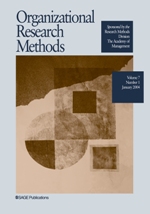Video-Based Research Methods
CALL FOR PAPERS
Guest Editors: Paula Jarzabkowski, Curtis LeBaron, Katherine Phillips, and Michael Pratt
The editorial team of Organizational Research Methods would like to invite authors to submit manuscripts for a special issue on video-based research methods.
Video technology has become a vital tool for data collection for many researchers, and there are many advantages to this method. Video can record behavior in real time and can then be slowed, zoomed and replayed, enabling precise analysis. Video also provides ontological opportunities for researchers, as well as insight into issues such as materiality, embodiment, spatio-temporality, and multimodality.
For the special issue, an article on video-based research methods might include topics such as:
– What methodological challenges are faced when using video data?
– Video data provides insight on space, place, bodies and physical arrangements that might not be noticed under standard observation methods. What new ontological and epistemological assumptions do researchers need to make when deciding what to examine in video?
– In most process research, time is considered to be a fluid concept, however with video time is visible. How can researchers cope with spatial-temporal notions that are captured in video data?
– There is a wide variety of data sources, for example, edited documentaries or video-recorded interviews are not the same as naturally occurring video of people in action, so which is considered to be good video data?
– How might emerging technologies, such as facial recognition and movement mapping, enable and motivate video-based methods in the future?
All papers will be reviewed under the standard double-blind ORM review process and must meet the standards of the ORM Editorial Policy Statement (see http://orm.sagepub.com). All articles published in this feature topic must improve our understanding of video-based research methods generally in the social sciences generally and organization studies specifically. Manuscripts should be submitted between September 15, 2014 and October 15, 2014 via the Organizational Research Methods online submission portal at http://mc.manuscriptcentral.com/orm.
For more information, view the full Call for Papers.
Please note that proposals may not be submitted until September 15, 2014.
Click here to learn more about Organizational Research Methods and sign up for e-alerts about the latest research from the journal.




























































































